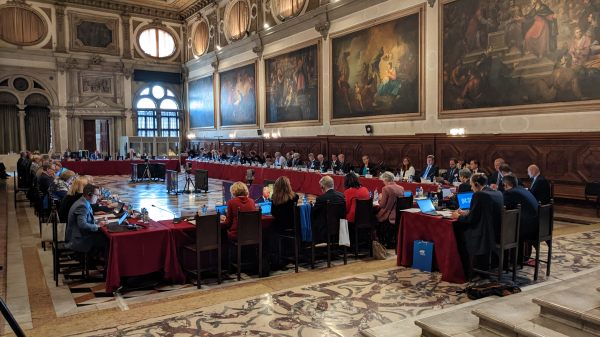Socialists await Venice Commission opinion amid MP mandate controversy

The Socialist Party’s parliamentary group leader attributed his party’s abstention on the vote to send the case of MP and former minister Olta Xhaçka’s mandate to the Constitutional Court to their uncertainty over the constitutional precedence between two key rights: the obligation to follow the Constitutional Court’s decisions vs. the right of each MP to vote freely.
What is this about
The debate centers on whether MPs can be compelled to vote in a certain way, particularly when it comes to issues like the validity of another MP’s mandate. The Socialists abstained during a late-night vote on September 12, resulting in 65 abstentions, 9 votes against, and 25 votes in favor of sending Xhaçka’s mandate issue to the Constitutional Court.
The Socialists emphasized that their abstention was not a rejection of the Constitutional Court decision but stemmed from uncertainty over which constitutional principle should prevail. They have sought clarification from the Venice Commission, an advisory body, which is expected to provide an opinion soon.
Questions Directed to the Venice Commission
Elisa Spiropali, a representative of the Socialist Party, addressed five key questions to the Venice Commission:
- Can MPs be required to vote in a specific manner in parliamentary democracies? If so, under what circumstances, and does this apply to motions regarding the compatibility of an MP’s mandate?
- What standards are used in other countries to determine incompatibility of an MP’s mandate, and what role does the legislative body play?
- How should the balance between an MP’s representative mandate and their role as members of the Assembly be interpreted in cases of mandate incompatibility?
- What is the role of the legislative body in determining incompatibility in other states, and is there judicial oversight of such decisions?
- Can the Constitutional Court create new constitutional norms beyond its interpretive powers, and can it establish new categories of subjects not explicitly listed in the Constitution?
What did they say
Niko Peleshi, the head of the Socialist parliamentary group, assured the media and the public that the opinion from the Venice Commission, though advisory and not binding, would be followed immediately.
International reactions
Following the vote, both the U.S. Embassy in Tirana and the European Commission delegation emphasized the importance of Parliament respecting Constitutional Court rulings, citing the need for institutional checks and balances. However, the vote highlighted a broader legal ambiguity concerning the constitutional rights of MPs, particularly the balance between their freedom to vote and their duty to uphold court decisions.
The Core issue: Xhaçka’s alleged conflict of interest
The controversy surrounding Xhaçka’s mandate stems from accusations by the Democratic Party that she is in a conflict of interest due to her husband’s status as a strategic investor, allegedly benefiting from public funds. Xhaçka has denied these accusations, arguing that the government’s designation of her husband – a well-known businessman, who is building a resort on public land and using public funds – as a strategic investor does not automatically translate to personal financial gain from public money. The status of strategic investor is granted to investments that fulfil a number of objective criteria, such as scale of investment, number of employees, impact on the area, etc.
Now, the Constitutional Court will have to determine whether the mandate of Xhaçka, as a lawmaker, is indeed incompatible with her duties due to the alleged conflict of interest, as claimed by her political opponents.


